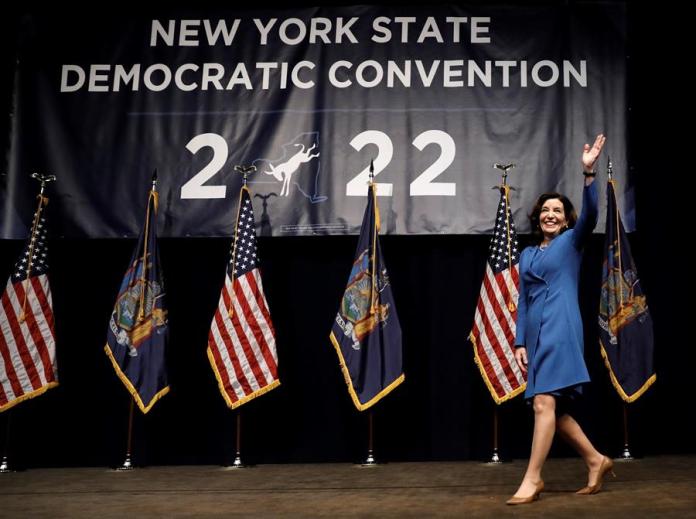This Thursday the Democrats’ convention was held in New York and the participation of speakers of Latino origin was almost nil. Had it not been for the disagreement of some leaders and elected officials, three Latino politicians who were not on the initial list presented days before the event would not have been included.
One day before the convention where current Governor Kathy Hochul was nominated for a full term, a list was delivered to the media that did not include the participation of politicians of Latino origin.
On the morning of the same day as the event held at the Sheraton Hotel in Midtown Manhattan, Congressman Adriano Espaillat, Assemblywoman Catalina Cruz, and Brooklyn Borough President Antonio Reynoso were suddenly added.
Reactions to this initial snub were immediate. Two of the first people to express their disagreement were the former president of the City Council, Melissa Mark-Viverito, and the activist and expert in national politics, Luis Miranda Jr.
“The Democratic Party has rebelled. You are basically saying that the Latino community has no role. It’s outrageous,” said Mark-Viverito, who was also surprised that Congresswoman Nydia Velásquez was not taken into account after having “expanded the party” and been an important voice in Brooklyn.
According to the New York Post, Mrs. Mark-Viverito, who represented the East Harlem area, also indicated that women are the majority in the state of New York, so they should have seen themselves reflected.
“The convention is a presentation of the values of the party. Who the party invites to officially stand on that stage and speak is a reflection of those values. Not having Latinas on that stage tells us that we don’t matter. And I’m not going to accept that,” she remarked.
Even though Latinos make up 20% of the electorate. At the state level, they also do not hold high-level positions. For this reason, some experts assure that Latino voices should be included not only in future conventions but also at the negotiating tables. It is then a claim with meaning that is made to the party.
New York State Democratic Party Chairman Jay S. Jacobs had said the preliminary list was allegedly tentative and that he made the “mistake” of giving a partial list to reporters.
This set off alarm bells among Latino political activists who have worked to appeal to the Latino electorate, who in recent years have become representatives of a community of voters loyal to the Democrats.
“There are no Latin speakers? How shockingly disrespectful to a community that represents one of the largest proportions of Democratic voters,” wrote political analyst Luis Miranda Jr.
For Mr. Miranda Jr. of Puerto Rican origin, these comments go beyond a simple claim and make-believe that the Latino community is invisible. He considers these actions of the main leaders of the Democratic Party to be a “deeper problem”.
It is a call to reflect on how many Latinos are at the table making decisions. In addition, how many are “writing policies for the platform”, and other issues that are of vital importance for political, economic, and social development. “Change is the only option,” said Miranda Jr.
Adriano Espaillat and Antonio Reynoso were not official speakers either, but as if to try to correct the blunder. Both leaders were assigned to make nominations for some electoral positions. Assemblywoman Catalina Cruz, for her part, was in charge of opening the convention with an emotional speech.
Congressman Espaillat during his speech clarified that “it was not the Democratic Party who asked me to be here today”, but rather it was the Attorney General of the state, Letitia James, who asked him to “put his name on the nomination”.
“Not having a Latino here is really something that weakens the party because our party should be, and is, a wide-ranging party, whose diversity is a strength, so we shouldn’t… be a second thought. We should not be a footnote. We have to be at the table,” Espaillat said.
The Bronx representative, who always speaks in English and Spanish in his speeches, added that “the party is not considering that.” And despite the fact that many Constituents, especially in New York City, are more frequently fluent in the Spanish language, Democratic leaders are not considering it. “They have to catch up and fix it,” Espaillat demanded.
The claims also came from various elected authorities who in recent years have increased their popularity by presenting bills that defend the Latino and immigrant community.
Queens Senator Jessica Ramos in an interview on the Inside City Hall program said that if the Democrats aspire to be the party of the working class they have to “comply with the people” and carry out actions that identify it as such.
In pursuit of that message, Senator Ramos demands that her peers in Albany pass bills related to “child care, health care, housing, and wages. Shouting out to essential workers is not how we mobilize people… This is how we are going to get people out to vote,” she stated.
Another of the representatives from the Bronx who also expressed his disagreement was Congressman Ritchie Torres, describing it as “surprisingly disrespectful to a community that represents one of the largest proportions of Democratic voters.”



















































































